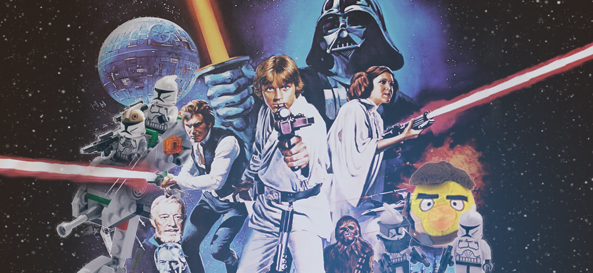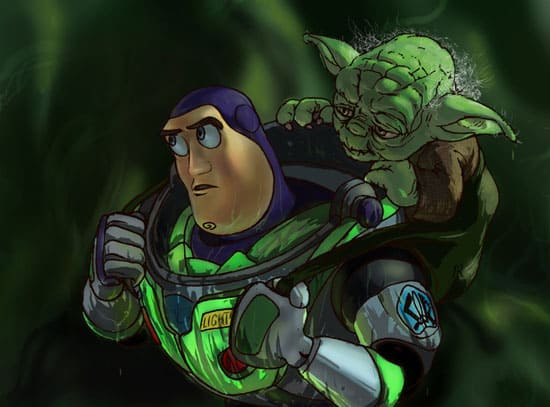
This week Disney made waves by acquiring LucasFilm and announcing plans for a seventh Star Wars film—yet fans haven’t exactly been applauding the news. Is this seventh film in response to public outcry calling for Hollywood to advance a Star Wars narrative that has been dormant since 2005? Hardly. The seventh film is likely the result of Disney siezing the opportunity to extract several hundred million dollars from the once-passionate fanbase of a once-proud franchise.
A press release from the two companies conveys the spirit of the acquisition: “[Kathleen Kennedy] will serve as the brand manager for Star Wars, working directly with Disney’s global lines of business to build, further integrate, and maximize the value of this global franchise.”
Integrating and maximizing the value of this global franchise! Doesn’t that make you want to put on your shiniest Stormtrooper armor and lineup outside your local movie theater? To paraphrase Obi-Wan, This isn’t the sequel you’re looking for.
If you’re like me, you walked out the first The Lord of the Rings film eager to see the second installment. The characters and their respective journeys were just getting started, so when the credits rolled on The Fellowship of the Ring we all looked forward to what would come next. On the other hand, If you’re like me, you walked out of the first Pirates of the Caribbean film thinking anything—anything—except this: “I hope they make three more of those bad boys!”
When we talk about story franchises, it’s important to remember not all franchises are created equal. Some are both artful and entertaining, while others are, well, commercially viable. The difference lies in why each franchise is constructed—either to serve the story or serve the studio. And perhaps there’s something to learn in this dichotomy even for those of us who aren’t in the movie business.
The Pirates movies are a case in point. Of course, Disney did make three more of them, and the reality is that the transition from film to franchise was simple math: $140 million budget, $650 million box office. Most studio executives can add and subtract, and these days the formula looks something like this:
$650 million – $140 million = “Let’s do that again!”
When something works once, the industry’s impulse is trot out the next installment within the next 18-24 months. One-off films aren’t good enough anymore—the movie business is too fraught with costly disappointments (Battleship and John Carter spring immediately to mind). Thus, studios are loath to allow any box office success to go unduplicated. As such, our culture’s preeminent storytelling medium is dominated by franchises built around superheroes, sexy teen vampires, sexy teen post-apocalyptic gladiators, robots, hobbits, Vin Diesel and … chipmunks.
I’m not a fan of franchises for which money—not story—is the impetus. Where nothing creative is ventured, nothing creative is gained. The Hangover 2 is a prime example—the math worked, and so the film was made. The goal was never to advance the narrative, but rather to make money. The strategy was to recycle the narrative, not advance it, in order to preserve as many elements as possible from the successful first installment.
We’ve all seen these movies that left us walking out of the theater, convinced our 10 bucks could have been better spent elsewhere.
On the other hand, franchises are a gift to audiences and the industry when their overarching narratives warrant continued exploration. Many would argue The Lord of the Rings, Star Wars, Batman and Harry Potter, among others, would fall into this category—because these are complex stories that deserve more than two hours in which to play out.
The heros are so inexperienced, the villains are so powerful, and the journeys are so arduous that it benefits us all when the filmmakers are granted the opportunity to take their time.
Whatever your favorite movie sequels and prequels may be, you’re likely drawn to them because they are story-driven. You’re invested in the characters and you’re compelled to follow their odysseys to their end. I don’t know about you, but I’m not afraid of these kinds of franchises. They cultivate character depth and narrative complexity at a time when shallow and simple are much more prevalent options.
The studio call to produce prequels and sequels taps into something bigger, however, than a mere night at the movies. The franchise decision arises from one of our basest human desires to exercise control over future outcomes. Rather than embrace the uncertainty and opportunity, we play it safe and stick to the beaten path. Especially when the stakes are high.
When a movie producer says, “I know this will play,” it’s not unlike a college student saying, “I don’t really care about business, but I might as well get a business degree because it’ll give me a better chance of being successful.”
What’s missing from the producer’s “safety in sequels” mindset? The same things that are missing from other struggling sectors of our world: faith, risk, passion, creativity and compelling stories. And the question for producers and the rest of us is the same: Are we serving the status quo, or the story? As Christians committed to God’s unfolding story of redemption in the world, this is not a question we can afford to ignore.
This is the curse of the franchise frenzy—in the movies as well as in our daily lives. When we become so fixated on bankable repetition, our imagination begins to atrophy. The result in the film industry? Unsurprising characters, a story that falls flat and cannot justify its own existnence apart from the opportunity to construct a decade-long PR campaign of casting spoilers, trailer premieres and Happy Meal toys. And on the flipside, Hollywood is subjecting itself to an ever-increasing reliance on film projects and properties with franchise potential.
Yet in a world where economy is often king, we’re all registered to vote. You have the power, with your money and attention, to vote in favor of quality storytelling. You can vote Paul Walker and his nitrous canisters out of office, and replace them with Terrence Malick and his dinosaurs.
Ultimately, the question is whether we’ll be people of style or people of substance. Choosing substance doesn’t mean rejecting franchises altogether, but it will require us to look past recognizable characters and costumes to the narratives beneath the surface. It’s only then that we can know if what we’re watching serves the story or the studio.
Although in the interest of full disclosure, I’ll warn you now—rumor has it a fifth Pirates of the Caribbean movie is in production.






















